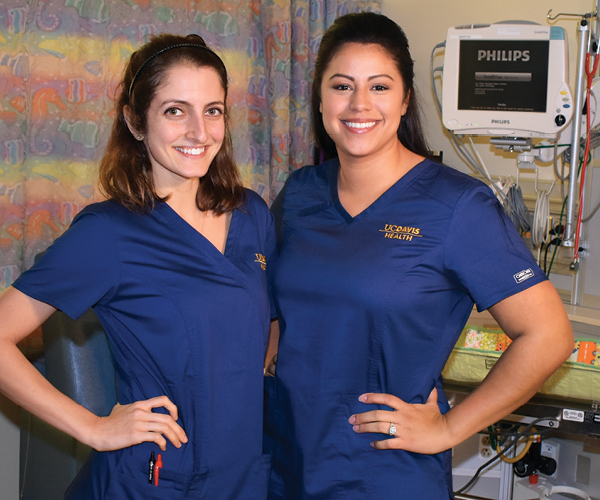
Inaugural master’s-entry nursing students enter practice
When 24 aspiring nurses entered the Betty Irene Moore School of Nursing at UC Davis in summer 2016, they arrived with big hopes for surviving the accelerated entry-level graduate program and big dreams for their futures as nurses. Less than two years later, a majority of that inaugural class realized those dreams.
“I actually interviewed for a position with UC Davis Medical Center’s new graduate residency program before I took the NCLEX licensing exam,” says Brooke-Ashley Cook, a 2017 alumna and the first in her class to land a job. “I knew once I passed the exam, I would start two weeks later as a neonatal intensive care unit (ICU) nurse, which I’ve dreamt of for 10 years.”
Cook, along with more than a dozen of her classmates, already demonstrated the clinical skills and knowledge required to become a registered nurse. But their experience at the School of Nursing equipped them with far more.
“Throughout our various leadership classes, I was prepared to deal with difficult conversations and how to think upstream to lead the way for growth and change,” says Alana Matarazzo, who works alongside Cook at the medical center. “The various interdisciplinary experiences I participated in during school also helped build my confidence and made it easier to contribute during rounds. I was able to voice my thoughts and opinions, rather than just be a fly on the wall.”
The master’s-entry coursework goes beyond the clinical elements to develop students’ leadership talents, build their technology skills, grow their interprofessional strengths and expand their knowledge of health systems and populations.
“Nursing deals with many more components than just administering medications and creating relationships. We care for people when they’re in the hospital, as well as other physical, mental, emotional and socioeconomic needs they and their family members may have,” explains Eric Yai, a class of 2017 alumnus who works in the burn ICU at UC Davis Medical Center. “As a new graduate nurse, I am putting this into practice by showing compassion to all patients, embracing mistakes that I make and consistently demonstrating enthusiasm to learn and grow.”
The School of Nursing prepares a new breed of graduates who are nimble enough to become agents of change in this new age of health care. Through unique coursework at UC Davis, Yai experienced a case-based curriculum that integrates concepts mapped across courses. This innovative approach decreases course isolation and facilitates students’ learning and teamwork. Early clinical exposures and purposeful integration of theory and practice also enable students to grow critical thinking skills early in their education.
“We are teaching our students the clinical skills they need. We are also teaching them how to think like a nurse, how to communicate like a nurse and how to interact with other members of the interprofessional health care team as a proud representative of the nursing profession,” says Assistant Clinical Professor Jessica Draughon Moret.
“We’ve learned the importance of being leaders who are culturally competent and have the capacity for advocacy and action at all levels,” adds Angelica Gales, a 2017 alumna who now works as a clinical nurse at UC San Diego Health. “By receiving our education from the Betty Irene Moore School of Nursing, we became nurses who are equipped and ready to promote bold system change.”

